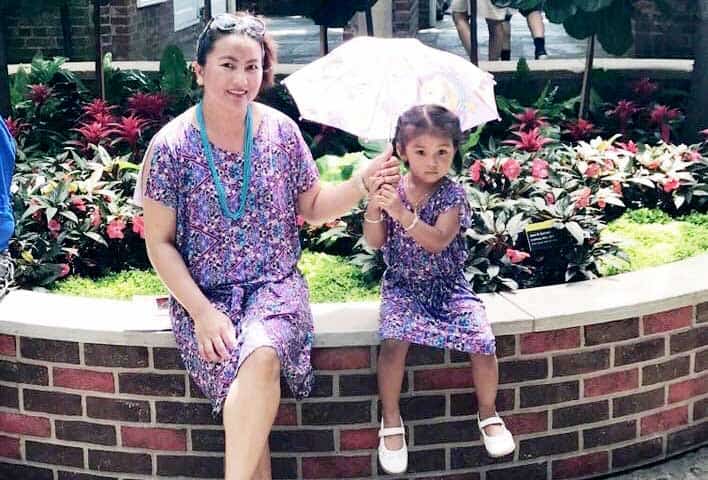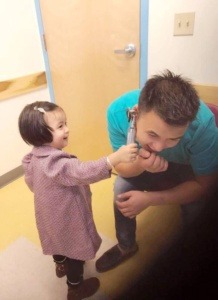
Finding her way: Dil’s story
Dil Gurung came to Pittsburgh as a refugee several years ago. When faced with the struggle to make ends meet, she found South Hills Interfaith Movement. We’ve been happy to see her journey unfold here in the U.S. and are humbled by her story of strength.
Chapter 1
MAKING THE CHOICE TO FLEE THEIR HOME
As a young girl, Dil Gurung lived in a small white house in Bhutan with her mom, dad and nine brothers and sisters. Dil’s father worked very hard to ensure all 10 of his children went to school. He always put his family first.
In 1992, Bhutan was no longer a safe place for Dil and her family to live. “The Bhutanese armies were going into people’s homes and destroying everything, burning down houses, and raping women. My dad wanted to save every child and protect us. He knew we had to leave,” Dil said.
At this time, Dil was 10 years old. All 12 of the Gurungs packed their things to make the long trek to Nepal, where they were told there would be help. A few days later, they arrived in Maidhar, a refugee camp in Nepal. They were given small amounts of grain and rice, plastic for shelter, and a few other limited supplies. Thankfully, Dil’s father was prepared, and brought rice from home to further sustain his family.
Things at Maidhar quickly took a turn for the worse. “People would catch a fever or the flu, everyone had terrible diarrhea with no proper outhouses. So many people died from infection. Many people dug graves for their loved ones,” Dil explained.
Dil’s father knew he had to get his family out of this refugee camp. He asked for help, and the family was able to move to Beldangi, a different camp close by where conditions were a little better. Here, they had a school house, restrooms, and better supplies for shelter, Dil recalled. Life was better here. Dil began going back to school, which she loved. But shortly after, she became extremely ill.
Chapter 2
Finishing school with support and determination
Dil was infected with cholera, which is a bacterial disease usually spread through contaminated water. “I was so sick for months. I almost died many times. I was delirious and didn’t know who anyone was,” Dil remembered.
Thankfully, Dil’s father had saved money, so he was able to get Dil the medical care she needed and slowly, but surely, she recovered. During the months she was sick, she was unable to attend school, and she lost all of her hair.
“When I finally got better and went back to school, it was terrible for a while. All of the kids made fun of me, and it was so hard,” Dil explained. “My parents encouraged me to be strong. I lived through this. I had to take control of my life. So I went to school.”
For the next 20 years, Dil lived in Beldangi. With much determination and help from her family, she completed her education through grade 12, learned English and even left for a year-long program in India where she taught young children.
When she returned, her older brother moved to the United States. “He lived in Idaho with his wife and children. He said life was better, and I should come live with them. I knew I needed to take care of my parents, but I wanted to go to America and earn some money to send back to them,” Dil said.
Chapter 3
Starting a new life

In 2011, Dil made the move to Idaho to live with her brother and sister-in-law. During this time, she kept in touch with a friend from Nepal, Birbal. They were beginning to develop a relationship, but being so far away, it was very difficult.
After about a year in Idaho, she was working as a housekeeper when she learned that her mother had fallen ill. Thankfully, she recovered, but Dil knew she had to go see her. When she arrived at the airport in Nepal, she was surprised to see Birbal waiting for her.
Shortly after, while still visiting in Nepal, Dil and Birbal decided to marry. However, since they were from different cultures, Dil being Bhutanese and Birbal being Nepalese, none of their parents approved.
“After 20 days of fighting, our parents came around, and my husband and I spent some time with my mom,” Dil said.
Dil, Birbal and Dil’s parents decided they’d move to Pittsburgh, as Dil’s other brother, Garju, explained that there were many opportunities in the city. Birbal and Dil’s parents began working on their paperwork to come to the U.S., and in the meantime, Dil returned to the U.S. and moved in with her brother Garju, his wife, and their infant daughter in Carrick.
Chapter 4
Working through a difficult time
Shortly after returning to the U.S., Dil discovered she was pregnant. “I was feeling scared to be pregnant alone and the way people would gossip about me. I got very depressed. There was not much community where we were living,” Dil remarked.
Her sister-in-law’s home visitor encouraged Dil to give SHIM a call. “I didn’t call right away. I was nervous. I had such little communication with my husband in Nepal. It was such a hard time.”
Dil’s perspective changed after receiving a large medical bill for more than $40,000 without health insurance. She knew she needed help and finally reached out to SHIM’s Prospect Park Family Center. “I called the Family Center and they helped me get the bill figured out, signed up for health insurance for my baby and me, and they told me about food stamps. That was a weight-lifted. I felt reborn,” Dil smiled at the relief.
“I thought my life was gone. But after talking to SHIM and then delivering my daughter, Arista, everything fell into place for me again,” she continued.
Chapter 5
A family well on its way to self-sufficiency

Shortly after Arista’s birth, Dil’s parents moved to the United States. Dil, her parents and Arista, along with Garju and his family, found a place to live in Prospect Park. With Birbal still working on his paperwork to move to the U.S., Dil was a single mom, but she found help through SHIM.
“I didn’t know what to do, how to earn money, how to care for her. I kept thinking it would be really hard to give Arista the things she needed, but SHIM was able to help, and it was wonderful,” Dil said. “We got help through SHIM’s home visiting program; we were able to get diapers at the food pantry and some clothes. I brought her to SHIM’s Nurturing Parent Group, and I attended SHIM’s Women’s Group where I received education, support, and learned how to take care of myself, others and my daughter.”
Finally, when Arista turned two in 2016, Birbal was able to move to Pittsburgh to join their family. Now, Dil, Birbal, Arista and Dil’s mother and father live together in Prospect Park. Birbal is working as a caregiver, and Dil stays home to take care of her aging parents and Arista.
Dil still gets her groceries at SHIM’s food pantry, but she’s also able to offer her skills to SHIM in return. “I do a lot of interpreting for SHIM. I help others fill out the forms for the food pantry. That makes me really happy to help because they helped me a lot,” Dil explained. Dil’s interpreting is another way SHIM is helping her be self-sufficient, as Dil is often paid for her help. However, Dil also just wants to give back to SHIM and offers to interpret sometimes as a volunteer service.
With the help of SHIM’s Prospect Park Family Center, Dil and her family are on their way to self-sufficiency. “I would like to offer my thanks to SHIM for all that they have provided for my family,” Dil added.
More stories
Read more stories about your neighbors
Test your refugee IQ
Take the quiz and see how well you know your refugee neighbors.
Get involved
Learn more about volunteer opportunities, host a food drive, or donate to support SHIM’s work.

